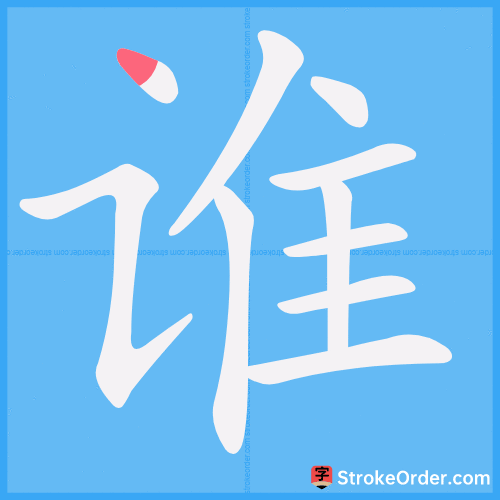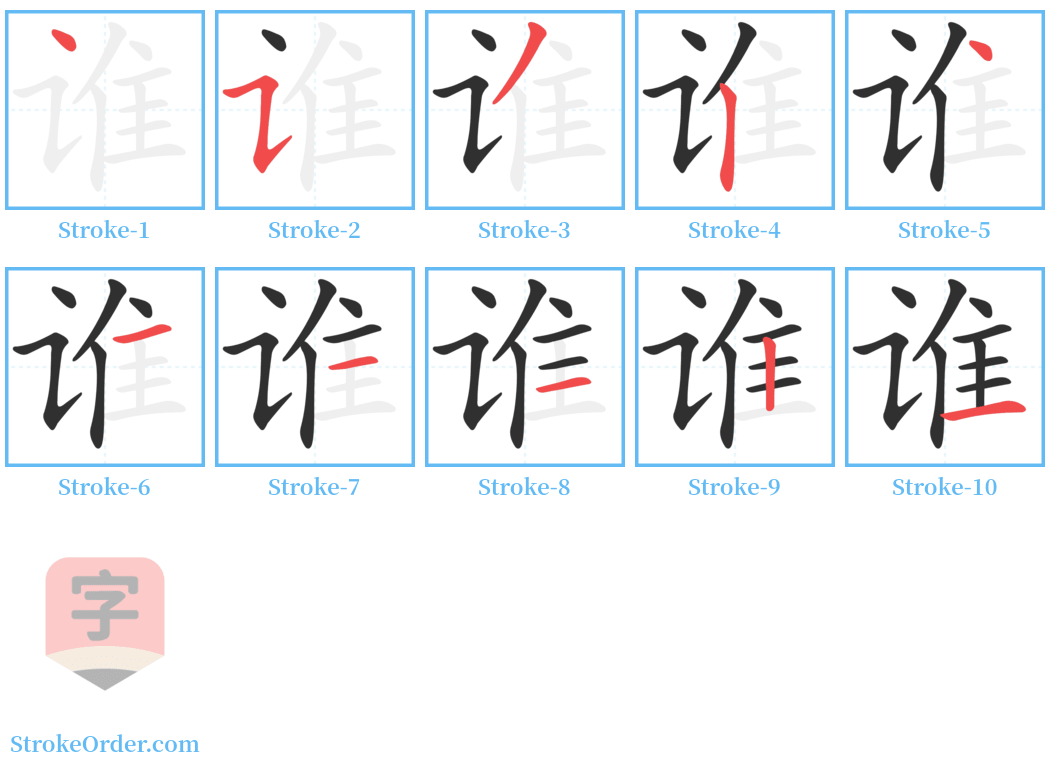谁 Stroke Order
Animated Stroke Order of 谁

Stroke Order Diagrams for 谁

Step-by-Step Handwriting Guide for 谁

Learn to Write Chinese Characters with Video Tutorials
Watch the video of writing the Chinese character "谁", learn the correct stroke order (笔顺) of the character "谁", and master the standard way of writing the character "谁".
Free Printable Handwriting Practice with Stroke Order: 谁
Printable Writing Practice Worksheet of "谁" in Portrait Orientation (Tian Zi Ge)

Printable Writing Practice Worksheet of "谁" in Landscape Orientation (Tian Zi Ge)

Information of 谁
Pinyin
shuí、 shéi
Radical
讠
Strokes
10 strokes
Usage
★★★★★
Definition
who, who
谁
shuí
1. 疑问人称代词:疑问人称代词,即用于提问或询问某个人或某些人,例如"你是谁?"、"谁在门口?"、"这个是给谁的?"
- Interrogative personal pronoun: Used to ask about a specific person or people, such as "Who are you?", "Who is at the door?", "Who is this for?"
2. 任何人,无论什么人:用于指代任意人,如在句子“这件事谁都不知道”中。
- Anyone, no matter who: Used to refer to any person, as in the sentence "No one knows about this matter."
3. 哪个人或哪些人 ([En.] who):例如“那是谁?”
- Which person or people ([En.] who): For example, "Who is that?"
4. 某人 ([En.] someone):例如“有谁能帮我?”
- Someone ([En.] someone): For example, "Is there anyone who can help me?"
5. 每个人 ([En.] everyone):例如“谁都不甘落后。”
- Everyone ([En.] everyone): For example, "No one wants to fall behind."
6. 表示疑问,指事物,相当于“什么” ([En.] what; where):例如“这是谁的书?”
- Indicates a question, refers to something, equivalent to "what" ([En.] what; where): For example, "Whose book is this?"
7. 另见 shéi:同样发音的另一个形式。
- See also shéi: Another form with the same pronunciation.
8. 虚指,表示不知道的人或无须说出姓名的人:如“我的书不知道被谁拿走了。”
- Vague reference to a person unknown or whose name is not needed: For example, "I don’t know who took my book."
9. 任指,表示任何人:如“这件事谁也不知道。”
- Indeterminate reference, indicating any person: For example, "Nobody knows about this matter."
10. 评论用法及示例:例如“他们俩谁也说不服谁。”说明不同的人之间的对话。
- Commented usage and examples: For instance, "Neither of the two could convince the other," indicating a discussion between different people.
这是这个字符的详细解释,包括它作为疑问代词的多种用法和语义。
to whom the deer falls (idiom); the one to emerge victor (i.e. to seize the empire) / prize winner / champion
Input Method for 谁
Pinyin
shui2
Wubi
ywyg
Cangjie
ivog
Zhengma
sni
Four Corner
30715
Unicode
U+8c01